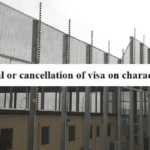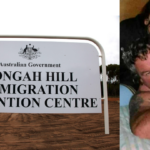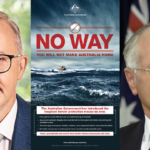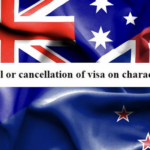A Nasty Little Labor-led Nation Is Ramping Up Deportations, or Is It?
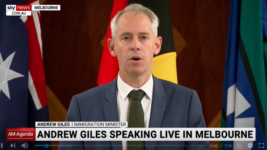
As Andrew Giles last week announced that he’s ramping up the deportation of noncitizens, it was clear he’s starting to look a little jaundiced like most MPs who hold the role of immigration minister tend to after a period in office, which is assumed to be due to the inhumanity the position involves.
Take Philip Ruddock: as the Howard government immigration minister from 1996 to 2003, he was required to dehumanise and bastardise some of the most desperate people on Earth, and by the end of his service, it did appear as if the blood had drained from his face and he was in need vitamin C.
The only politician who seems to have flourished in the job to the point of taking on a healthier appearance is former PM Scott Morrison, who not only was the architect of Operation Sovereign Borders, but he initiated late 2014 reforms that have led to the mass deportation of residents.
However, Giles had a pretty easy job at first. He came to office, as the Coalition had just deported over 7,000 noncitizens, including close to 3,000 New Zealand-born residents, and Andrew’s boss, Anthony Albanese, promised NZ he’d be implementing what was a mild and modest reform plan.
But Giles wasn’t looking so amiable last week, as he was seen to be reversing last year’s reforms, which have now been decried as too lenient in terms of long-term residents, or noncitizens, having their ties to the country considered, which has led to some cancelled visas being restored.
On a deportation roll
The immigration minister signed Direction 110 on 7 June. Ministerial directions are guidances produced under authority of section 499 of the Migration Act 1958 (Cth), which are orders aimed at officials performing functions within the Act, in order to assist in the exercising of those powers.
“Since coming to office, the government has refused and cancelled a large number of visas on character grounds in the interests of community safety,” Giles told the press, and he added that the issue is the appeals tribunal is making decisions that don’t result in residents being deported.
“Since the beginning of last week, I have cancelled 40 visas in the national interest,” said Giles, as he flashed his impressive load to the press.
Direction 110 relates to section 501 of the Migration Act (Cth), which contains a character test that results in the automatic deportation of noncitizens if they’re sentenced to 12 months or more prison time.
But that doesn’t have to be all at once, as multiple terms can trigger deportation, as can suspended sentences and time in rehab.
In fact, Morrison’s 2014 amendments dropped the preexisting 24 month limit down to 12. And the UN had already ruled in 2011 that the pre-reform version was in breach of international law.
Turfing out kiwis
One effect of Morrison’s law, which acted retrospectively, was that literally thousands of NZ-born long-term residents were turfed out. People who had spent almost their entire lives here were deported. And the government didn’t warn Wellington either: deportees just started arriving.
Since Morrison’s law kicked in, New Zealand-born people, who’d never featured in the list of top ten nations represented in Australian onshore immigration centre figures had become the largest cohort in detention by 2016, and still today, the NZ-born make up the largest numbers in those facilities.
The mass deportation of New Zealanders from the country devastated their local communities. Families were torn apart. And Aotearoa had to set up a support system to deal with the large numbers of Australian residents suddenly appearing in the country without a home to go to.
Then NZ PM Jacinda Ardern raised the issue of Australia exporting its criminals to her country repeatedly with Morrison, who just smirked and shrugged. But when Albanese was voted in as PM, this all changed, as he declared that he’d bring in a more compassionate approach to deportations.
Primary concerns
Direction 90 was signed by then immigration minister Andrew Hawke in March 2021. It replaced 2018’s Direction 79. And in terms of changes, it added an extra primary consideration when deciding whether or not to throw a resident out of the country.
The three considerations already required in Direction 79 were, in order of listing, “protection of the Australian community from criminal or other serious misconduct”, “the best interests of minor children in Australia” and “expectations of the Australian community”.
Hawke’s Direction 90 added a further consideration, placed at number two in the list, which involved “whether the conduct engaged in constituted family violence”.
And last year’s Direction 99 added a fifth consideration, at third place on the list, which was “the strength, nature and duration of ties to Australia”.
This last stipulation has always been one of the main gripes about the deportation system, as it has led to people who’d been living in the community for their entire lives, beside birth, being thrown out, and this was especially so with the NZ-born.
And Direction 110 has now been issued as the Liberals were asserting that community safety was being risked because the Administrative Appeals Tribunal, which is stacked with Coalition associates, had granted people permission to stay in Australia because of their strong links to the nation.
Issuing the same direction
“Ministerial Direction 110 is guided by two key principles: the protection of the Australian community and commonsense,” Giles told the press last week and added that this has been done by making it clear that “safety of the Australian community is the government’s highest priority”.
However, a perusal of Direction 110 shows that it contains the same five priority considerations as its predecessor. And “protection of the Australian community” remains the number one consideration, as it has been since 2018. In fact, the order of priorities is the same as Direction 99.
Even the controversial consideration of “strength, nature and duration of ties to Australia”, the provision that has evidently led to the nation becoming a less safe place over the last year, remains at fourth position on the list of primary considerations.
In ending his statement, Giles said that the new direction serves to elevate “the impact on victims of family violence and their families into one of the existing primary considerations, reflecting the government’s zero-tolerance approach to family and domestic violence”.
So, it would appear that Giles’ new direction will likely have no real impact on how many deportations occur after it takes effect on 21 June as it’s basically the same order the immigration minister released last year.
But Giles did succeed in cutting a tough antiforeigner figure before the cameras last week, and one might note that he’s awfully good at copying and pasting as well.



